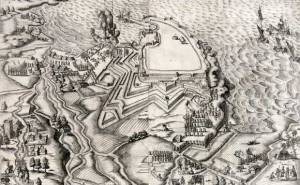Recherche par publications
Recherche multi-critères
Recherche par localisation géographique
Henri et Louis de La Mothe-Fouquet
Claude Thomas

Les biographies de ces deux frères issus d'une bonne famille huguenote saintongeaise, connus sous le nom de Saint-Surin, illustrent bien les problèmes auxquels fut confrontée la noblesse protestante au début du XVIIe siècle, au moment de la « naissance dramatique de l'absolutisme »*. Tiraillés entre la fidélité au Roi et celle à leur religion et à ses privilèges, ils furent soldats et moururent jeunes à la guerre. L'aîné, Henri, fut également diplomate en tentant de s'entremettre entre Buckingham et Louis XIII. Considéré comme un parfait « honnête homme », il incarne aussi, par ses mœurs et son goût pour les lettres, le mouvement de « civilisation » de la noblesse, en conservant le sens d'une solidarité de caste.
The biography of these two brothers, issued from a respectable Saintonge Huguenot family known under the name of Saint-Surin, is a good illustration of the various problems the Protestant gentry-folk had to face in the beginning of the 17th century, with the “dramatic birth of absolutism”.
Torn between loyalty to their king and faithfulness to their religion and its privileges, they both joined the army and died at war while they were still quite young. Henri, the elder brother, also acted as a diplomat when he endeavoured to intervene between Buckingham and Louis XIII. Owing to his gentlemanly way of life, and a taste for literature, this perfect honnête homme further embodied the ‘civilization’ trend that was developing among members of la noblesse, while still retaining a sense of caste solidarity.
(Roccafortis n°45, janvier 2010, p.283-295)
Thèmes : guerres, personnages, protestants
Henri et Louis de La Mothe-Fouquet_R45 (2087Ko)
